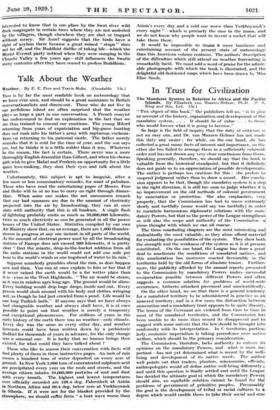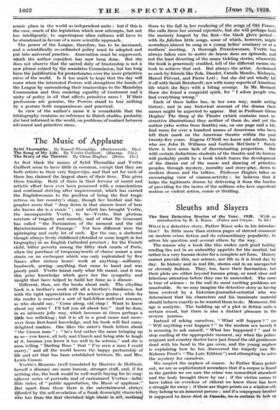In Trust for Civilization The Mandates System in Relation to
Africa and the Pacific, Islands. By Elizabeth van Maarten Hehner, Ph.D. (P. S.
Bing and Son, Ltd. 15s.)
" THE object of this book," the publishers tell us, " is to give- an account of the history, organization and development of the mandates system. . . . It should be of value . . . to those who would foresee what it is going to become."
So large is the field of inquiry that the duty of criticism is not an easy one, and Dr. van Maarten Helmer has not made this duty any easier : for while, on the one hand, she has collected a great many facts of interest and importance, on the other she has failed to arrange them in a sufficiently coherent order and has not drawn any very clear conclusions from them: Speaking generally, therefore, we should say that the book is valuable from the historical standpoint, but that it definitely does not guide us to an appreciation of possible developments. The author is perhaps too cautious for this : she prefers to suspend judgment rather than to draw a moral. Her conclu- sion appears to be that, though the mandates system is a step in the right direction, it is still too soon to judge whether it is an improvement on the old methods of colonial government by annexation or protection. She also emphasizes, very, properly, that the Commission has had to move extremely; slowly and tactfully (some would say too tactfully) in order; to maintain harmonious diplomatic relations with the man.' datory Powers, but that as the power of the League strengthens, so will also the scope and authority of the Commission —a: pious thought with which we can all concur.
The three concluding chapters are the most interesting and undoubtedly the most valuable, as they alone afford material for evaluating the possibilities of the system. They show both, the strength and the weakness of the system as it is at present constituted. On the one hand, the League has done a great deal to ameliorate the conditions of mandated natives, and this amelioration has moreover reacted favourably in the territories held by the old forms of absolute tenure. Further- more, the publicity afforded by the annual reports presented to the Commission by mandatory Powers makes successful co-operation possible between different Powers and often suggests a common solution for problems of world-wide occurrence, hitherto attacked piecemeal and unscientifically.
On the other hand, we see that there is a general tendency for a mandated territory to be administered in practice as an, annexed territory, and in a few cases the distinction between annexation and a mandatory trust appears to be quite illusory: The terms of the Covenant are violated from time to time in most of the mandated territories, and the Commission hafi been unable to do more than record its disapproval and to suggest with some naivete that the law should be brought into conformity with its interpretation. In C territories particu-; lady, economic imperialism is taking precedence over native welfare, which should be the primary consideratinn: The Commission, therefore, lacks authority to enforce its. opinions on the mandatory Powers, and—what is more portant—has not yet determined what is meant by the well.: being and development of its native wards. The autlioi well points out that traders, planters, missionaries, officials, anthropologists would all define native well-being differently ; and until this question is finally settled and until the League has decided the ultimate goal at which the mandatory Powers should aim, an equitable Solution cannot be found for they problems of government of primitive peoples. Presumably the goal is the development of tribal or racial cultures to a degree which would enable them to take their social and eco•
nomic place in the world as independent units : but if this is the case, much of the legislation which now attempts, but not too intelligently, to superimpose alien cultures will have to be abandoned in favour of a more scientific approach.
The power of. the League, therefore, has to be increased, and a scientifically co-ordinated policy must be-adopted and put into universal practice. Annexation must be suppressed, the author, considers has now been done. But she; does not observe that the sacred duty of trusteeship is not a neW phrase .coined by the mandates Commission, but has long been the justificationlor protectorates over the more primitive races of the world. Is it too much to hope that the day will come when the interested Powers will strengthen the hands of the League by surrendering their trusteeships to the Mandates Commission and thus ensttring equality of treatment and7a-- unity of policy in all that affects _primitive races ? If their professions are- genuine, the Powers- stand to lose nothing by a gesture" both magnanimous' and practical. In view of the .authoes name it is remarkable that the bibliography contains_no reference. to Dutch studies, probably the best inforiried in the world,-on problems-Orcontacf hetw.een advanced and primitive races.









































 Previous page
Previous page